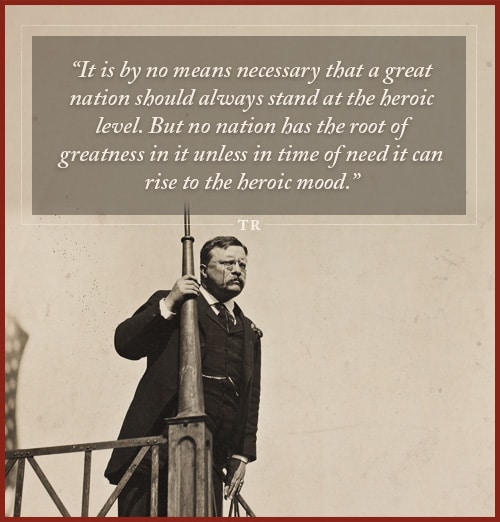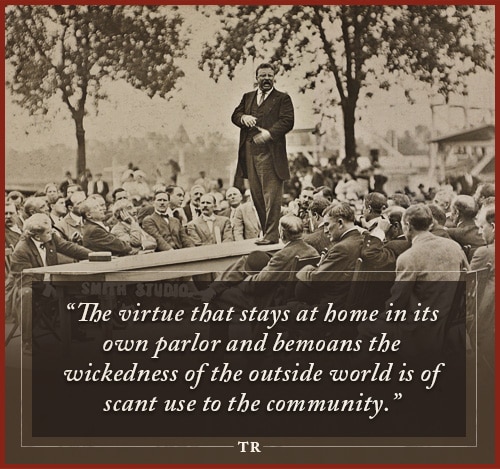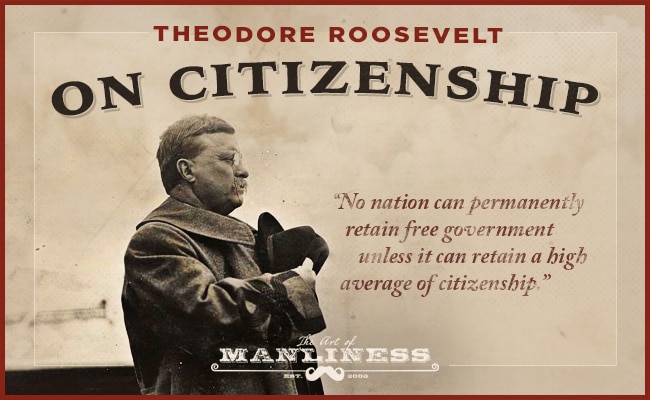
Waller Newell has said that “In some ways, TR and Churchill have more in common with Homer and Shakespeare than they do with us.” That break has perhaps never been felt more acutely in recent history than during this bitter, divisive, circus-like election. Many people feel something has gone terribly wrong, but have difficulty describing exactly what, and what politics would ideally look like instead. It seems we have lost not only an understanding of the philosophical framework of citizenship, but the very language of virtue. We long for that which we are too morally inarticulate to voice.
Enter the words of Theodore Roosevelt. Below you’ll find a small treasury of excerpts from some of the addresses he gave during his lifetime. When you look at anthologies of all his speeches, you find that the themes he hits in these selections were the ones he offered, with only slight alterations, over and over and over again, in every town and city he visited on country-crossing whistle stop tours. You’ll likely be surprised to find how much they resonate, and yet how almost foreign this kind of rhetoric sounds. One finds it impossible to imagine any modern politician speaking this way — using this lost language of virtue, and charging citizens towards both noble ideals and practical common sense.
TR’s words call to us from the dust — challenge us to revive what we haven’t even fully realized we’re missing, and to take responsibility for that which we claim to loathe in politics.
During this election, there has been plenty of head-shaking and tsk-tsking; all that seems foul is the fault of that “other” party, those “other” people who do not share one’s values. Or the problem is the poor slate of candidates, all of whom the average voter finds repugnant to varying degrees. Yet a people invariably gets exactly the candidates it deserves, and they emerge not from one segment of the population, but from the cultural milieu to which every single individual, on every side of the aisle, contributes.
Every link one does or does not click influences the kind of media that will be produced in the future. Every willpower-exercising point of etiquette one chooses to either uphold or skip impacts our culture’s ability to delay gratification — to choose long-term gains over short-terms satisfactions. Indeed every time you say “please” and “thank you,” or answer a text while someone is trying to talk to you, you either strengthen or weaken the future of democracy. No kidding; if you don’t understand why, then read this article.
TR understood. He knew that unless the majority of individual citizens educated themselves thoroughly, acted decently, and lived virtuously — unless the nation maintained a “high average of citizenship” — the republican experiment would fail.
As this election comes to an end, and we look towards what is to come, let us reflect on his words, and spend less time tsking others, and more time contemplating how we ourselves might become better, and strengthen the character of our friends, families, co-workers, and communities. So that in an election still hence, we might again get exactly the candidates we deserve, and yet have a very different problem than the one we currently face — the opportunity to choose between the greater of two goods.
Theodore Roosevelt on Citizenship
AT MILWAUKEE, WI, APRIL 3, 1903
I appeal for the qualities that tell for good citizenship. They are many. But after all, they come down chiefly into three categories. In the first place honesty and decency — I use the words in their widest significance; not merely the honesty that refrains from theft; but the aggressive honesty that will not see a wrong without trying to right it.
That first. But by itself that is not enough. No matter how honest a man may be, if he is timid, there is but little chance of his being useful to the body politic. In addition to honesty you must have strength and courage. We live in a rough world, and good work in it can be done only by those who are not afraid to step down into the hurly burly to do their part in the dust and smoke of the arena. The man who is a good man, but who stays at home in his own parlor, is of small use. It is easy enough to be good, if you lead the cloistered life, which is absolutely free from temptation to do evil because there is no chance to do it.
In addition to honesty and decency you need courage and strength. You need not only the virtues that teach you to refrain from wrong doing, but the virtues that teach you positively and aggressively to do right. You have to have those, too. And if you have got them, still it is not enough. You are valueless without them; you are valueless as a citizen unless you are both honest and brave, but if, in addition to that, you are a natural born fool, may the Lord be with you.
We need courage and we need honesty, and finally we need the saving grace of common sense. And we shall get good results from good citizenship exactly in proportion as the average citizen is developed along the three lines that I have indicated; for that is the man who will have high ideals, and yet will be able to realize them in practical fashion. That is the man who will keep his eyes on the stars, and yet not forget that in this world of ours he must have his feet on the ground. The man who will strive after a high ideal, but strive after it in methods that will permit of its realization.
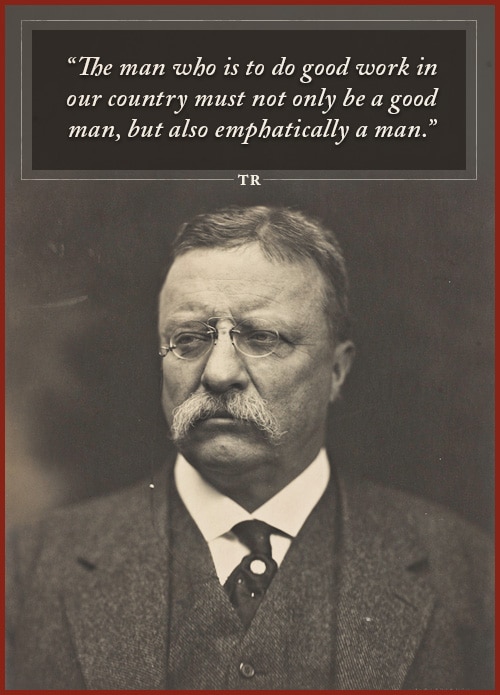
AT NEW YORK, NY, FEBRUARY 26, 1903
Remember that the greatness of the fathers becomes to the children a shameful thing if they use it only as an excuse for inaction instead of as a spur to effort for noble aims.
The pioneer days are over. We now all of us form parts of a great civilized nation, with a complex industrial and social life and infinite possibilities both for good and for evil. The instruments with which, and the surroundings in which, we work, have changed immeasurably from what they were in the days when the rough backwoods preachers ministered to the moral and spiritual needs of their rough backwoods congregations. But if we are to succeed, the spirit in which we do our work must be the same as the spirit in which they did theirs. These men drove forward, and fought their way upward, to success, because their sense of duty was in their hearts, in the very marrow of their bones. It was not with them something to be considered as a mere adjunct to their theology, standing separate and apart from their daily life. They had it with them week days as well as Sundays. They did not divorce the spiritual from the secular. They did not have one kind of conscience for one side of their lives and another for another.
If we are to succeed as a nation we must have the same spirit in us. We must be absolutely practical, of course, and must face facts as they are. But in addition to the hard, practical common-sense needed by each of us in life, we must have a lift toward lofty things or we shall be lost, individually and collectively, as a nation. Life is not easy, and least of all is it easy for either the man or the nation that aspires to do great deeds.
If during this century the men of high and fine moral sense show themselves weaklings; if they possess only that cloistered virtue which shrinks shuddering from contact with the raw facts of actual life; if they dare not go down into the hurly-burly where the men of might contend for the mastery; if they stand aside from the pressure and conflict; then as surely as the sun rises and sets all of our great material progress, all the multiplication of the physical agencies which tend for our comfort and enjoyment, will go for naught and our civilization will become a brutal sham and mockery. If we are to do as I believe we shall and will do, if we are to advance in broad humanity, in kindliness, in the spirit of brotherhood, exactly as we advance in our conquest over the hidden forces of nature, it must be by developing strength in virtue and virtue in strength, by breeding and training men who shall be both good and strong, both gentle and valiant—men who scorn wrongdoing, and who at the same time have both the courage and the strength to strive mightily for the right.
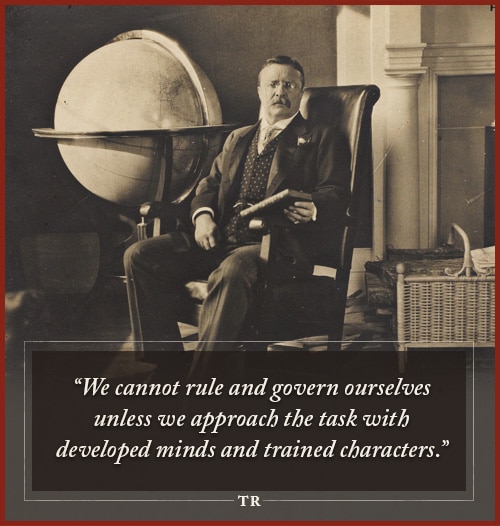
AT CHICAGO, IL, APRIL 2, 1903
Now, the aim in production of citizenship must not be merely the production of harmless citizenship. Of course it is essential that you should not harm your fellows, but if after you are through with life all that can be truthfully said of you is that you did not do any harm it must also be truthfully added that you did no particular good.
Remember, that the commandment had the two sides, to be harmless as doves and wise as serpents; to be moral in the highest and broadest sense of the word; to have the morality that does and fears, the morality that can suffer and the morality that can achieve results. To have that, and coupled with it to have the energy, the power to accomplish things which every good citizen must have if his citizenship is to be of real value to the community.
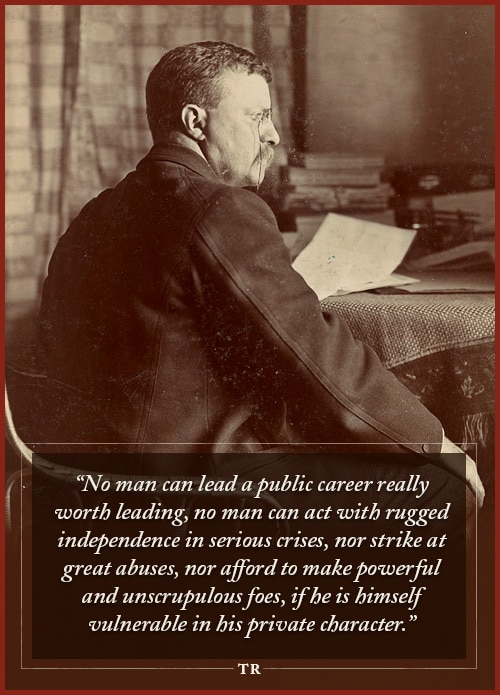
AT THE LOUISIANA PURCHASE EXPOSITION, 1906
We have every right to take a just pride in the great deeds of our forefathers; but we show ourselves unworthy to be their descendants if we make what they did an excuse for our lying supine instead of an incentive to the effort to show ourselves by our acts worth of them. In the administration of city, State, and Nation, in the management of our home life and the conduct of our business and social relations, we are bound to show certain high and fine qualities of character under penalty of seeing the whole heart of our civilization eaten out while the body still lives.
We justly pride ourselves on our marvelous material prosperity, and such prosperity must exist in order to establish a foundation upon which a higher life can be built; but unless we do in very fact build this higher life thereon, the material prosperity itself will go for but very little.
The old days were great because the men who lived in them had mighty qualities; and we must make the new days great by showing these same qualities. We must insist upon courage and resolution, upon hardihood, tenacity, and fertility in resource; we must insist upon the strong, virile virtues; and we must insist no less upon the virtues of self-restraint, self-mastery, regard for the rights of others; we must show our abhorrence of cruelty, brutality, and corruption, in public and in private life alike. If we come short in any of these qualities we shall measurably fail; and if, as I believe we surely shall, we develop these qualities in the future to an even greater degree than in the past, then in the century now beginning we shall make of this Republic the freest and most orderly, the most just and most mighty nation which has ever come forth from the womb of time.
There is no patent device for getting good government, as there is none for winning in war. Weapons change and tactics change, but the quality of the fighting man remains unchanged as the qualities that made Caesar’s legions victorious, the quality that made such superb soldiers out of the men who followed Grant and Lee. Discipline is necessary and the fool that will not submit will only be beaten. If you put the best of weapons in the hands of a coward he will be defeated by the brave man with a club.
After all has been done in the way of taking advantage of the best weapons it remains true that against a foe equal in power we can win only by showing the iron resolution, the hardened will that never bends till the end sought has been attainted. No device that the wit of man can produce, no form of law or of organization among ourselves can supply the lack of fundamental virtues the absence of which has meant the downfall of any nation since the world began. No smartness, no cleverness, unaccompanied by the sense of moral responsibility will ever supply the presence of fundamental precepts put forth in the Bible and put forth in the code of morals of every successful nation in the history of the world from antiquity to modern times.
Always, in any government, among any people, there are certain forces for evil that take many shapes, but which are rooted in the same base and evil characteristics of the human soul, in the evil of arrogance, of jealousy, envy, hatred; and to certain people the appeal is made to yield to one set of evil forces. To some it is made to yield to another set, and the result is equally bad in each case. The vice of arrogance, of hard and brutal indifference on the part of those with wealth toward those who have not, is a shameful and dreadful vice. It is not one whit worse than the rancorous hatred and jealousy of those who are not well off for those who are. The man, who, either by practice or precept, seeks to give to any man or withhold from him any advantage in law or society or in the workings of society or business because of wealth or poverty, is false to the traditions of this republic.
Your problems were those of war. At the opening of the Twentieth century ours are problems of peace. The tremendous industrial development of this country with its complexities has brought with it very much of good and some of evil. Let us think carefully before, by any act of folly, we destroy what has thus so marvelously been built up. It is easy to pull down but not so easy to rebuild or to replace, and let us take serious thought from the history of “the republics of old and avoid the rocks on which they foundered and the chief rock—the chief danger in the path of each of the old republics of antiquity of the middle ages.
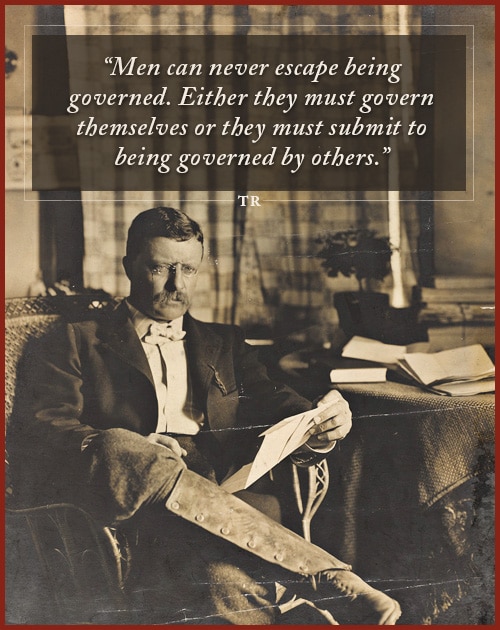
FROM “CITIZENSHIP IN A REPUBLIC,” 1910
The very last thing that an intelligent and self-respecting member of a democratic community should do is to reward any public man because that public man says he will get the private citizen something to which this private citizen is not entitled, or will gratify some emotion or animosity which this private citizen ought not to possess.
Let me illustrate this by one anecdote from my own experience. A number of years ago I was engaged in cattle-ranching on the great plains of the western United States. There were no fences. The cattle wandered free, the ownership of each being determined by the brand; the calves were branded with the brand of the cows they followed. If on the round-up an animal was passed by, the following year it would appear as an unbranded yearling, and was then called a maverick. By the custom of the country these mavericks were branded with the brand of the man on whose range they were found. One day I was riding the range with a newly hired cowboy, and we came upon a maverick. We roped and threw it; then we built a little fire, took out a cinch-ring, heated it at the fire; and the cowboy started to put on the brand. I said to him, “It is So-and-so’s brand,” naming the man on whose range we happened to be. He answered: “That’s all right, boss; I know my business.” In another moment I said to him: “Hold on, you are putting on my brand!” To which he answered: “That’s all right; I always put on the boss’s brand.” I answered: “Oh, very well. Now you go straight back to the ranch and get what is owing to you; I don’t need you any longer.” He jumped up and said: “Why, what’s the matter? I was putting on your brand.” And I answered: “Yes, my friend, and if you will steal for me you will steal from me.”
Now, the same principle which applies in private life applies also in public life. If a public man tries to get your vote by saying that he will do something wrong in your interest, you can be absolutely certain that if ever it becomes worth his while he will do something wrong against your interest.
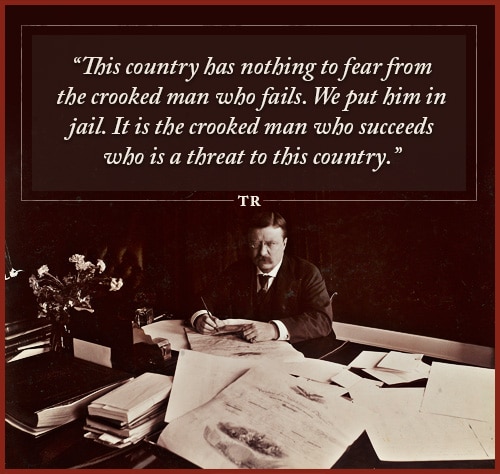
FROM THEODORE ROOSEVELT: AN AUTOBIOGRAPHY
The Speakership contest enlightened me as regards more things than the attitude of the bosses. I had already had some exasperating experiences with the “silk stocking” reformer type, as Abraham Lincoln called it, the gentlemen who were very nice, very refined, who shook their heads over political corruption and discussed it in drawing rooms and parlors, but who were wholly unable to grapple with real men in real life. They were apt vociferously to demand “reform” as if it were some concrete substance, like cake, which could be handed out at will, in tangible masses, if only the demand were urgent enough.
These parlor reformers made up for inefficiency in action by zeal in criticizing; and they delighted in criticizing the men who really were doing the things which they said ought to be done, but which they lacked the sinewy power to do.
They often upheld ideals which were not merely impossible but highly undesirable, and thereby played into the hands of the very politicians to whom they professed to be most hostile. Moreover, if they believed that their own interests, individually or as a class, were jeoparded, they were apt to show no higher standards than did the men they usually denounced.
One of their shibboleths was that the office should seek the man and not the man the office. This is entirely true of certain offices at certain times. It is entirely untrue when the circumstances are different. It would have been unnecessary and undesirable for Washington to have sought the Presidency. But if Abraham Lincoln had not sought the Presidency he never would have been nominated. The objection in such a case as this lies not to seeking the office, but to seeking it in any but an honorable and proper manner. The effect of the shibboleth in question is usually merely to put a premium on hypocrisy, and therefore to favor the creature who is willing to rise by hypocrisy. When I ran for Speaker, the whole body of machine politicians was against me, and my only chance lay in arousing the people in the different districts. To do this I had to visit the districts, put the case fairly before the men whom I saw, and make them understand that I was really making a fight and would stay in the fight to the end. Yet there were reformers who shook their heads and deplored my “activity” in the canvass. Of course the one thing which corrupt machine politicians most desire is to have decent men frown on the activity, that is, on the efficiency, of the honest man who genuinely wishes to reform politics.
If efficiency is left solely to bad men, and if virtue is confined solely to inefficient men, the result cannot be happy. When I entered politics there were, as there always had been— and as there always will be — any number of bad men in politics who were thoroughly efficient, and any number of good men who would like to have done lofty things in politics but who were thoroughly inefficient. If I wished to accomplish anything for the country, my business was to combine decency and efficiency; to be a thoroughly practical man of high ideals who did his best to reduce those ideals to actual practice. This was my ideal, and to the best of my ability I strove to live up to it.
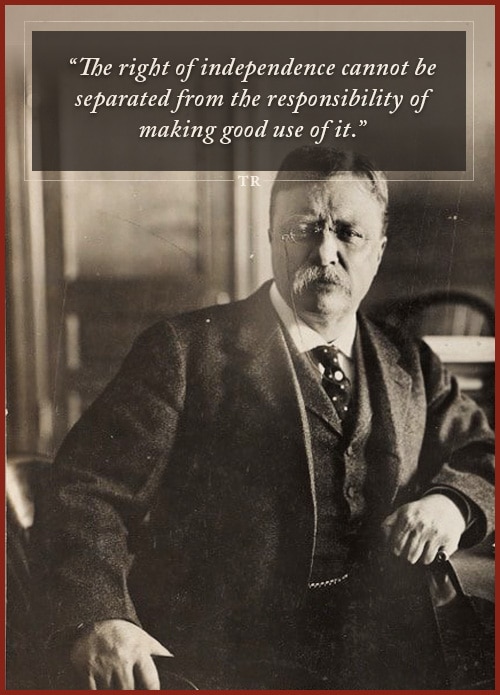
AT WASHINGTON, D.C., NOVEMBER 20, 1904
I wish you well in doing the most important work which is allotted to any of our people to do. The rules of good citizenship are tolerably simple. The trouble is not in finding them out, the trouble is in living up to them after they have been found out. I think we all of us know fairly well what qualities they are which in their sum make up the type of character we like to see in man or wife, son or daughter. But I am afraid we do not always see them as well developed as we would like to.
I wish to see in the average American citizen the development of the two sets of qualities, which we can roughly indicate as sweetness and strength — the qualities on the one hand which make the man able to hold his own, and those which on the other hand make him jealous of the rights of others just as much as for his own rights. We must have both sets of qualities.
In the first place, the man must have the power to hold his own. You probably know that I do not care very much for the coward or the moral weakling. I want each of you boys and the girls just as much, and each of you young men and young women, to have the qualities without which people may be amiable and pleasant while things go well, but without which they cannot succeed in times of stern trial. I wish to see in the man manliness, in the woman womanliness. I wish to see courage, perseverance, the willingness to face work, to face, you men, if it is necessary, danger, the determination not to shrink back when temporarily beaten in life, as each one will be now and then, but to come up again and wrest triumph from defeat. I want to see you men strong men, and brave men, and in addition I wish to see each man of you feel that his strength and his courage but make him the worse unless to that strength and courage but make him the worse unless to that strength and courage are joined the qualities of tenderness toward those he loves, who are dependent upon him, and right dealing with all his neighbors.
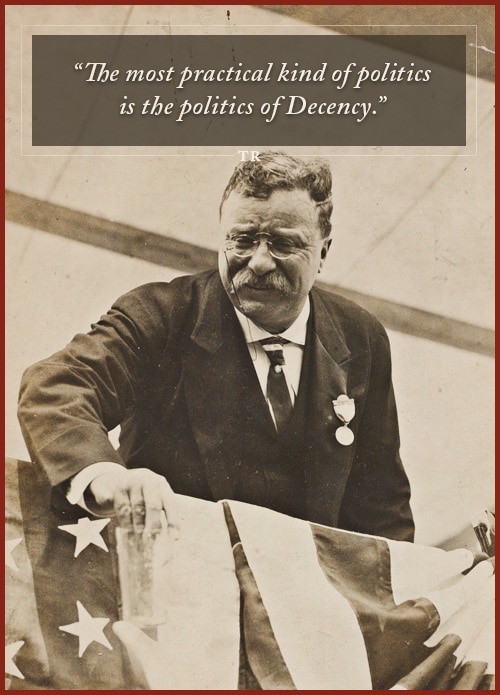
AT KANSAS CITY, MO, MAY 1, 1903
There is a certain tendency among many excellent people to believe that everything can be accomplished by law, that where there is a bad law it is due to the state and society, and that there is an immediate need for radical changes.
The millennium is a good way off yet. Mankind lived some thousands of years ago. We have made steady progress, but is has been because while we kept our eye on the stars we kept our feet on the ground. It has been by working up to lofty ideals in practical ways that law can do something, at times a good deal. The honest and fearless administration of the law can do much good, but a bad administration can bring all our efforts to nothing. Often much can be done by organization among ourselves, but when all has been said and done, when the best laws have been enacted and well administered and we have done all we can do to help one another, it still remains fundamentally true, and has been so since the beginning of the world, that in the long run the chief factor in any man’s success must be the sum of that man’s qualities and characteristics.
No law will ever make a coward brave, a fool wise or a weakling strong. All the law can do is to shape things that no injustice shall be done by one to another and so that each man shall be given the chance to show the stuff that is in him.
There is no device to make good government. There are plenty of countries like ours, governed under the same laws, and the net outcome is absolutely different, because back of the laws lies a different set of men, who determine the success or failure of any republic, and there is no patent device for getting good citizenship. We need strong bodies; we need more than that; we need strong minds, and, more than that, we need character into which many elements enter, the principal ones being honesty in its widest and deepest sense, decency and morality. These make a man a good father, a good husband, a good employer, a good man in his relations to the state, and something more.
But it matters nothing how good a man be if he is afraid; you can’t do a thing with him. The man who sits at home in the parlor and bemoans his fate will never succeed. We need more of daring, strength and will. When we say “He is not only a good man, but a man,” we say a good deal, but we must also be able to say “He is a real sensible man,” for in every man we need the saving grace of common sense.
If we fail in developing the qualities in our average citizenship we shall fail as a nation. And oh, my fellows, my countrymen, we are going to succeed. As a nation we are going to make this the greatest the sun has ever shone upon, because we are going to develop a sense of honesty and character to a degree hitherto unknown among the nations of the earth.
